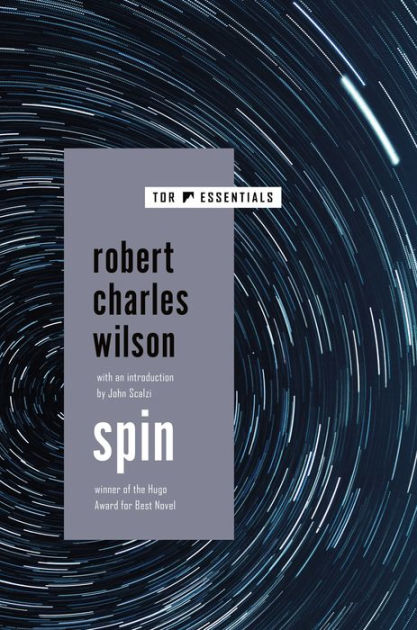To everything, turn, turn, turn

In the immediate present, the Beamers tackled the far, far future, looking at the end of human time and the extinction of our Sun. With a particular if peculiar hope. In the dark of winter, what could brighten our days? This time, it was the 2006 Hugo winner, Spin, by Robert Charles Wilson, a novel that answers the Fermi Paradox (“Where are they?”) question with an answer that promises a future that includes humans, though maybe not exactly as we might have wished. Would the Beamers stride into the days of a dying Sun heads high, or would we take to our final frontier with folded hands?
Time keeps on ticking into the Future
Spin is the first of a three-book series that recounts the encounter of humankind with the Hypotheticals, a galaxy-spanning culture that puts Earth into a temporal “cocoon” that travels in a slower time current, 100,000,000 times behind the rest of the Solar system. Given the remaining lifetime of the Sun, that sluggish clock means 40 or 50 years till Earth is swallowed in a bloated Sun’s expanded atmosphere. The focus of the book is the relationships of three characters who grow up in the era of the enshrouded Earth: Jason, Diane, and Tyler. Each is challenged to find a meaningful life within a circumstance that seems to promise only extinction, personal and global. Mr. Wilson’s ability as a writer is challenged to keep the reader interested as he interleaves his narrative with flashbacks and memories amid the tale of how the three main characters face their final days on Earth.
The tangled narrative may have been the most problematic feature of the novel for us, especially given the plethora of sf ideas that Mr. Wilson packs into its pages. Jason is a genius who is aggressively groomed to be heir to his father’s high-tech empire, but his own vision of talking with the aliens does not sit well with a parent more used to command than to communication. Diane, his sister, finds her solace less in high-tech solutions than in spiritual faith and belief in a benevolent universe. Tyler, their childhood friend, is tugged in both directions, leaning toward science but expressing his belief in compassion by becoming a physician. Their personal histories, the political maneuvers around Jason and his father both scheming to understand and break the Spin, as well as romance between Diane and Tyler, gave us plenty to process. But Mr. Wilson does not stop there, as Diane’s religious quest involves end-of-days cults and Biblical red heifers, Jason’s plans to terraform Mars produce a 100,000-year-old civilization that comes back to Earth, and Tyler finds a new patient with the man from Mars. All this while the book is also taking into Tyler and Diane surviving a genetic makeover and a cloak-and-dagger run through the newly built star gate in the Indian Ocean. Still, as Fran noted in her e-mail comments, we could adjust to the narrative time jumps as the plot unfolded.
Time flies like an arrow
So, is it a love story, a techno-thriller, or a hard sf yarn? Yes. Having so much to say, some of us thought it might be saying too much. Kathy was attracted to the strong character focus but disliked having to wade through the high-tech lingo and the inter-character lectures. For me, I almost found the reverse to be true; the strong character focus was often obscuring some of the more interesting hard sf nuggets. 100,000-year-old civilization on Mars? Tell me more! Fran found that even the secondary characters, like Jason’s father E.D., showed development and growth. And the choice of first-person narrator (Tyler) did mean that the viewpoint was very personal, which Chris liked, but not nearly global enough for some of us. John thought that sticking with the perspective of DC power brokers and stereotyped suburban housewives limited the sense of how the Spin and the apparent loss of the cosmos would affect cultures that depend on and respect the natural world more than the typical set of Beltway bandits who occupy much of the novel. Even with Diane becoming part of an end-times Christian sect, the sense of the world coming to an end within everyone’s lifetime did not seem to produce the kind of panic mixed with desperate hedonism that most of us expected. Still, the closeness to the main characters did keep most of us interested in finding out how they would (or would not) survive, techno-babble notwithstanding.
Time to talk things out
And yet, the thoughts in the book are big ones. John compared the novel to Arthur C. Clarke’s classic of alien-mediated human evolution, Childhood’s End, which he felt was superior to Spin. He was disappointed that Mr. Wilson could not (would not?) clearly state his philosophy of humanity’s destiny. Alan echoed that dissatisfaction with the book’s refusal to introduce either an optimistic or pessimistic take on the idea of humans faced with a galaxy awash in self-replicating robots ala John von Neumann. Being kept as pets seemed like a hard pill for humanity to swallow, in his opinion. Penn found the same cosmic connection to be more exhilarating, giving the book a sweep through time and space that few sf books even try to reach. His re-introduction to hard sf was a particularly welcome one, he said. That mysterious Martian culture we only glimpse did grant us the idea of a “Fourth” age of human lifetimes, a period of bodhisattva-like contemplative calm that appealed to some of us working our way through the third phase of seniority.
Plus, we all agreed on the literary merits of the book, which has a lot of fallible, recognizable, human characters, who earn our sympathy and respect. Roberto, who chose the book for us, was moved by the relationship of Jason and his entrepreneur father, where, even if we clearly picked a side, neither one was hero or villain and their disagreements were wrapped in visions for humanity’s future as much as in balance sheets and Presidential access. If the world and its cities did not explode into quite as many fires and riots as we might have expected to see, it still had a richly beating heart whose pulse ticked off the novel’s timeline as much as the reports of new constellations and spots on the bloated face of the Sun.
To sum up, we wound up raising our glasses and our ratings after spending some time working through the tangles and the teases. Penn led us with an enthusiastic ‘9’, a block of us followed with (maybe soft) 8’s, and some 7’s followed to finish up. Kathy, having picked up the third book in the series (Vortex), vowed to continue, and the possibility of another Wilson work on the Beamer reading list was bruited. To every book, there is a season, after all.
- Posted in: Meeting Notes
- Tagged: Hard science fiction, robert charles wilson, Spin

Great review of a great discussion, thanks! Footnote on the lack of “panic” scenes: there was some reference to the global reaction, albeit not direct reporting with the exciting immediacy that I am accustomed to in “apocalyptic” fiction:
‘…. coverage of the Stockholm riots. A mob of cod fishermen and religious radicals threw bricks through windows and burned cars; police helicopters peppered the crowd with tanglefoot gel until much of Gamla Stan looked like something a tubercular Godzilla might have coughed up. I made a fatuous remark about how badly people behave when they’re frightened, and Molly said, “Come on, Tyler, you actually feel sympathy for these assholes?” “I didn’t say that, Moll.”’